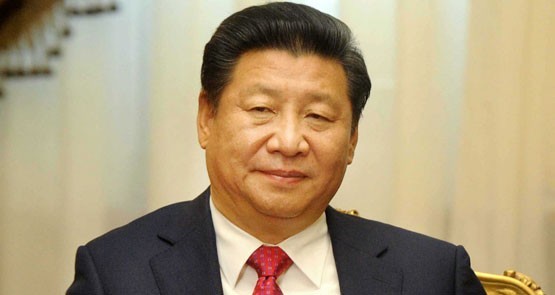
“If you want to marry, marry someone like Xi Dada, a man full of heroism with an unyielding spirit; no matter how the world changes and how many difficulties lie ahead, he will insist and keep moving forward.”
— Online song about Chinese leader Xi Jinping that has gone viral this week.
“Xi Dada” means “Uncle Xi” and refers to China’s Communist Party chief, military commission chairman and President Xi Jinping. A kind of personality cult, feared by the party’s top brass ever since the murderous reign of Mao Zedong, is rapidly growing around Xi.
In coming weeks it will be on display for the world to see — and worry.
The annual “liang hui”, or “two sessions”, of China’s rubber-stamp parliament, the National People’s Congress (NPC), and the even more ephemeral Chinese People’s Political Consultative Conference, will be fully underway tomorrow.
It is a carefully choreographed show, replete with China’s minorities — mainly hill tribes — in colorful national dress. Every piece of proposed legislation, pre-ordained by a Communist Party committee in the previous six months, will be passed with various levels of overwhelming majorities.
At the end of this 10-day performance, China’s Premier Li Keqiang will give a press conference, the only time all year that any member of China’s seven-man (it’s always men) ruling Politburo Standing Committee (PSC) submits for media questioning. Even then, it’s heavily vetted.
But this year, the NPC will be far less about Li or the NPC’s chairman Zhang Dejiang (the CCP’s official No. 3) or chairman of the CPPCC Yu Zhengsheng (its No. 4) than the party’s supreme leader, Xi Jinping, who has no official role at either “session”.
That is because China these days is all about Xi, a man who has amassed power over the past three years in a manner unprecedented since — depending on which pundits one listens to — Deng Xiaoping and Mao Zedong.
In recent months, the fawning and increasingly compliant state-run media — rogue journalists and editors have been run out of their publications under Xi’s rule — have begun to refer to Xi as the “core” of the party’s leadership, a sobriquet briefly used by Deng about Jiang Zemin as he tried to stabilise the country after the Tiananmen Square massacre, but not in the 26 years since.
Yet this is simply code. Xi Jinping is now, quite clearly, China’s dictator. The others in the PSC such as Li Keqiang — and the larger 25-person (there are two women) politburo — are merely bit players, support acts for the glory of the leader.
The centerpiece of the NPC is Li’s annual “work report”, which lays out the state of the Chinese economy. As has been well documented, things ain’t good. Generally, consensus is that growth has slipped to about 4% despite high official figures, and that swathes of the country are actually in recession.
Li will, no doubt, talk once more of the next wave of economic reforms that have stalled since they were laid out two and half years ago. Only China’s most fervent boosters have any confidence that they can be executed. And the more Xi concentrates power and surrounds himself with yes-men, a program laid out by The South China Morning Post this week, the less likely that the execution of the program becomes.
Personality cults and the crushing of dissent have rarely been associated with economic progress in human history, yet China is trying to convince the world that this time it is different.
Australia has little choice but to go along with the ride, but the answer to diversifying our China-dependent exports lies not in moving away from mining — the commodities slump has taken that choice away from us — but in diversifying the countries to which we sell our goods and services.
At the NPC, China-watchers will be looking for signs of political unity — they are likely to find them — and, more importantly, signs of who is being groomed to take their seats in the next round of leaders, due to be elevated next October. The bets are, it will be another slew of Xi’s mates.
The often fierce and largely unseen internal debate inside the Chinese Communist Party is one of the key reasons the country has been able to keep pushing forward despite the hugely problematic model of a one-party state with no independent institutions.
The thinning band of optimists still believe that Xi’s power consolidation is about creating a platform for pushing reforms through dispensing of internal opposition ahead of time.
Perhaps, but time is beginning to run out for Xi Dada to show his metal.








Timely article. Perhaps it’s time for Xi to show his mettle as well.